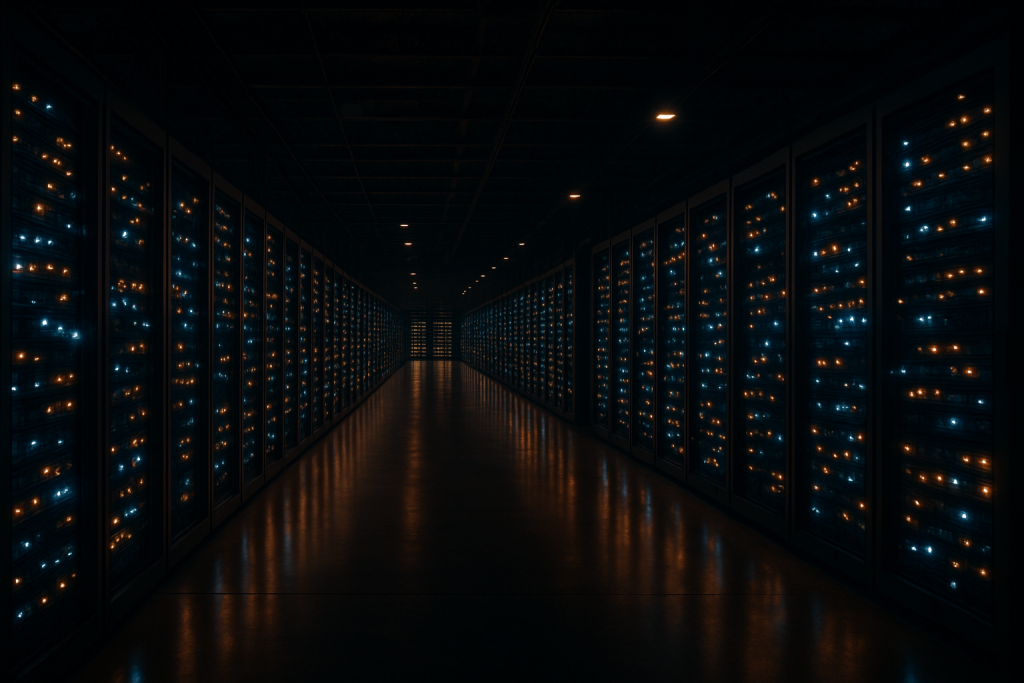The year is 2025. Flying cars still aren’t a thing, sadly. But artificial intelligence? It’s everywhere. And powering that AI revolution requires something even less glamorous than a DeLorean with wings: data centers. Big ones. Really, really big ones.
Yesterday, OpenAI and Oracle dropped a bombshell: a massive 4.5 gigawatt expansion of their collaborative project, Stargate. That brings the total Stargate capacity to over 5 gigawatts, fueled by more than 2 million chips. To put that in perspective, that’s enough juice to power several small cities- or, more likely, a whole lot of AI algorithms.
But Stargate isn’t just about raw power. It’s a statement. A declaration that the U.S. intends to stay at the forefront of the AI race, a race that’s quickly turning into a global superpower showdown. Think of it as the digital equivalent of the space race, except instead of rockets and moon landings, we’re talking about algorithms and data centers.
The broader Stargate initiative, potentially reaching a staggering $500 billion and 10 gigawatts, had previously announced its first data center in Abilene, Texas. Yes, that Abilene. It also involves significant investment from SoftBank. We’re talking potentially $19 billion commitments from both OpenAI and SoftBank. That’s a lot of ramen.
So, what’s the big deal? Why all this fuss about server farms the size of small countries? Well, AI, especially the kind of cutting-edge AI that OpenAI is building, is incredibly power-hungry. Training those massive language models, the ones that can write poetry, generate code, and even carry on surprisingly coherent conversations, requires immense computational resources. We’re talking about chewing through data at a rate that would make even Skynet blush. Stargate is designed to feed that insatiable hunger.
Oracle’s involvement is crucial here. They bring the infrastructure expertise, the know-how to build and manage these colossal data centers. It’s a symbiotic relationship. OpenAI has the algorithms, and Oracle has the real estate and the power grid connections. It’s like peanut butter and jelly, or maybe more accurately, silicon and electricity.
But let’s not get carried away with visions of AI utopia just yet. Some analysts are raising eyebrows about the financial viability of Stargate. $500 billion is a serious chunk of change. And the fact that funding sources and specific data center locations haven’t been officially confirmed adds a layer of intrigue, and perhaps a little skepticism. It’s like ordering a pizza without knowing the price or when it’s going to arrive. You’re hungry, but you’re also a little nervous.
The Geopolitical Chessboard
Beyond the financial questions, there’s a significant geopolitical angle to all of this. Remember President Trump? Well, even in 2025, his influence on policy is still being felt. His administration made it a national priority to maintain U.S. dominance in AI, and Stargate is a direct reflection of that ambition. The U.S. is acutely aware of the rapid advancements being made in China, and it’s determined to not be left behind. It’s like a high-stakes game of digital chess, and the data centers are the rooks and queens.
Whispers of Dissent
Interestingly, there have been reports of tensions between OpenAI and SoftBank. Apparently, a scaled-down 2025 target in Ohio didn’t quite pan out. But the companies are now aiming to surpass their initial goals. It’s a testament to the relentless pace of innovation in the AI world. Even setbacks are just opportunities to recalibrate and push even harder.
The Ethical Quandaries
And then there’s the ethical side of things. Powering these massive AI models requires a lot of energy, and that raises questions about environmental sustainability. Where is all this electricity coming from? Is it clean energy, or are we burning more fossil fuels to feed the AI beast? These are questions that need to be addressed, and quickly. We don’t want to solve one problem by creating another.
Furthermore, the increasing power of AI raises questions about bias, job displacement, and even the potential for misuse. As AI becomes more integrated into our lives, it’s crucial that we have safeguards in place to ensure that it’s used responsibly and ethically. It’s like giving someone a lightsaber. It’s incredibly powerful, but it can also be incredibly dangerous in the wrong hands.
The Bottom Line
Ultimately, the expansion of the Stargate initiative is a bold move. It’s a gamble, a bet on the future of AI. It’s a sign that the AI revolution is far from over, and that the stakes are only getting higher. Whether it pays off remains to be seen, but one thing is certain: the world is watching.
So, buckle up, folks. The AI ride is just getting started. And it’s going to be a wild one.
Discover more from Just Buzz
Subscribe to get the latest posts sent to your email.


